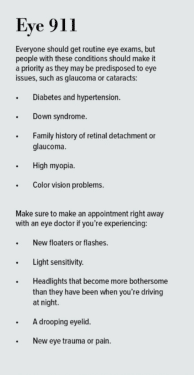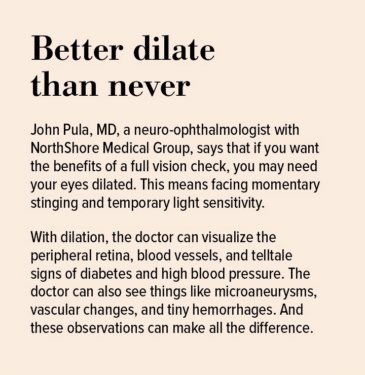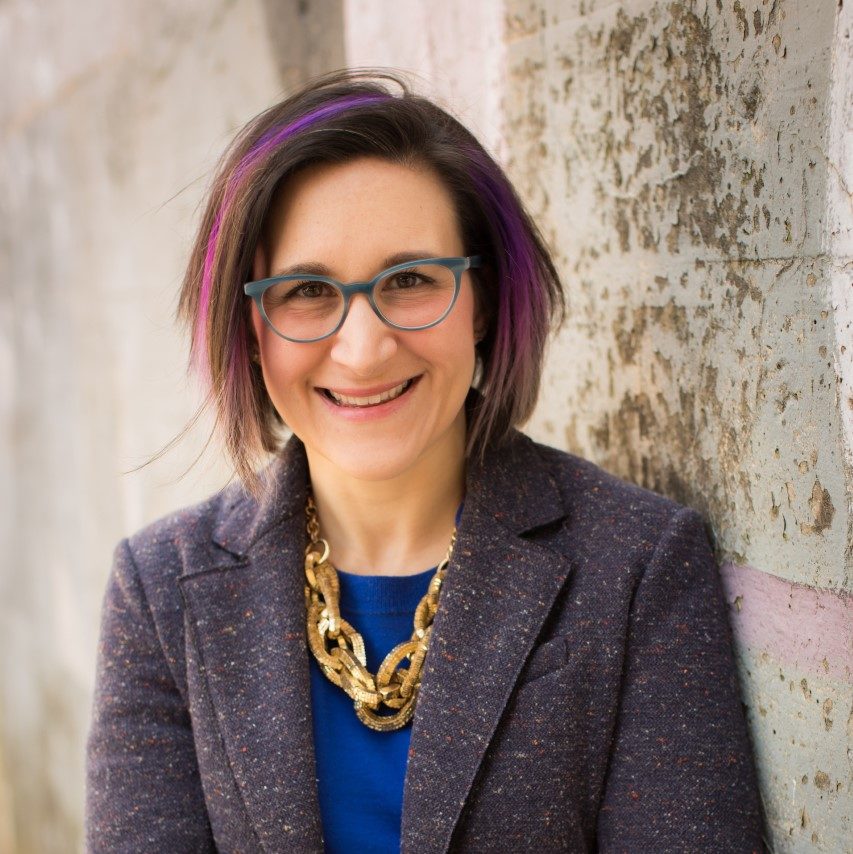How a routine vision check can save your life
Jackie Memije assumed she was just stressed out, so she ignored her symptoms. The whooshing in the ears, the bad headaches, the back pain, and the visual flares that looked like lightning.
Memije, a project billing specialist based in Round Lake Beach, figured anxiety from the early lockdown months of the Covid-19 pandemic was causing her symptoms — until a spur-of-the-moment optic check in early 2021 revealed signs of a brain tumor.
Regular eye exams do so much more than determine when a person needs glasses. Doctors can screen for issues like diabetes-related vision loss, glaucoma, cataracts, hypertension — even tumors.
However, the Centers for Disease Control and Prevention reports that of the estimated 93 million American adults in the United States at high risk for serious vision loss, only half visited an eye doctor in the past 12 months. More than half of American adults who don’t schedule eye care avoid screenings due to cost or lack of awareness of the preventive capabilities of eye checks.
Memije, 47, hadn’t planned on getting an optic nerve check, but she accompanied her husband, who has diabetes and high blood pressure, to a routine check at LensCrafters in Gurnee in February 2021.
“I was being goofy, and I was like, ‘I haven’t had a picture taken of my eyes in a long time. I’ll get one too,’” Memije says, referring to the back of the eye imaging known as a fundus exam. “I got my picture taken, got called back to the room, and Dr. Veronica Hene told me, ‘You need to get to the ER now.’”
The fundus exam had revealed signs of a brain tumor. At the hospital, scans did not show any tumors or lesions. However, a lumbar puncture performed later showed Memije’s cerebral spinal pressure was high.
“I had one of the worst migraine headaches I’d had in a long time. As the doctor was taking the fluid out, oh my gosh, my headaches went away instantly. It was the best feeling I had in the whole wide world,” she says.
She was diagnosed with a pseudo-tumor cerebri (false brain tumor) — high pressure within the skull caused by poor absorption of cerebrospinal fluid, which occurs mainly in women. The condition can cause severe or permanent complications, including stroke or blindness, if left untreated.
Fighting the fear

But routine eye exams can catch some diseases early, such as high blood sugar or high blood pressure, when they’re much easier to manage. “You may see changes in the retinal exam that show structural changes before there are any symptoms in the body,” Pula says. “By catching diseases at that early stage, not only can you prevent vision loss from worsening, but you can also help the patient get follow-up care from a primary doctor.”
Ophthalmologist Benjamin Ticho, MD, associate professor of ophthalmology at the University of Illinois Eye & Ear Infirmary, recommends including eye checkups as part of a preventive approach to medical care, instead of waiting for vision problems to arise. Regular eye exams can detect conditions such as diabetes, multiple sclerosis, or hypertension, as well as sight-threatening but treatable eye diseases such as glaucoma, cataracts, and macular degeneration.
“Put eye care in with the rest of your medical care,” he says. “Don’t let eye stuff slide just because it’s not convenient. It’s like a colonoscopy. Nobody likes it, but you gotta do it.”

Memije returned to LensCrafters this year to speak face-to-face with the optometrist who sent her to the emergency department. She had one thing to say:
“I told her, ‘You saved my life.’”
Originally published in the Spring/Summer 2023 print issue.

Claire Zulkey lives in Evanston. Her health stories have also appeared in Chicago Health, the New York Times, the Atlantic and Runner’s World.












